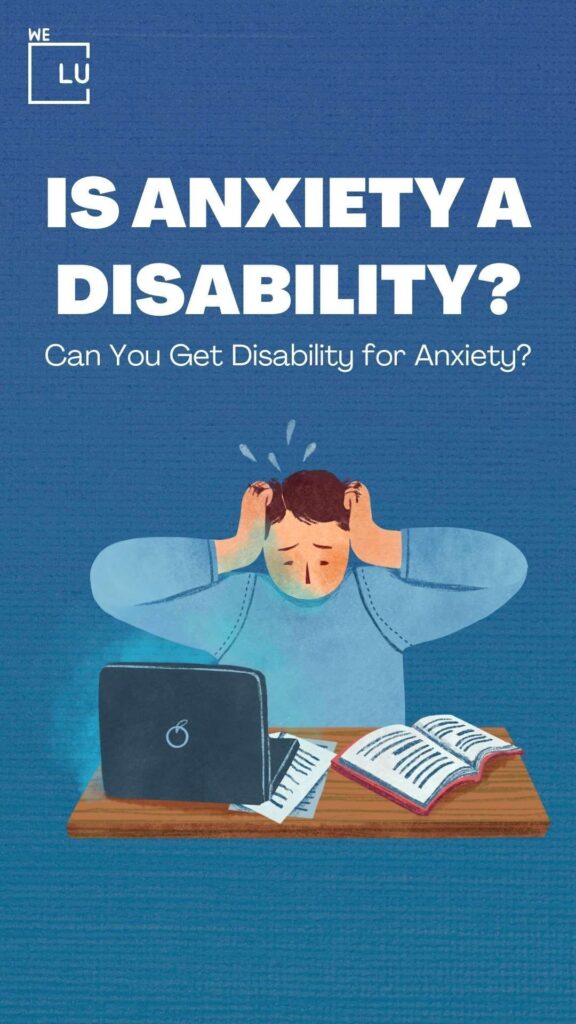Is Anxiety a Disability?
While it is common to experience occasional anxiety, individuals with anxiety disorders often face overwhelming and persistent worry and fear in everyday situations. Anxiety disorders frequently involve recurring episodes of intense anxiety and panic, known as panic attacks, which can disrupt daily activities and are challenging to manage.
These feelings of anxiety are often disproportionate to the actual threat, making it difficult to control and may persist for extended periods. To avoid these distressing experiences, individuals may avoid specific places or situations. Symptoms of anxiety disorders can emerge in childhood or adolescence and persist into adulthood.
Can You Get Disability for Anxiety?
Disability benefits may be obtained for anxiety disorders. Certain criteria must be met for an anxiety disorder to qualify for disability benefits like Social Security Disability Insurance (SSDI) or Supplemental Security Income (SSI).
To qualify for disability benefits, the anxiety disorder must be so severe and persistent that it prevents the individual from engaging in substantial gainful activity for an extended period of time.
Medical evidence from healthcare professionals like psychiatrists, psychologists, and therapists should back up claims about the symptoms and effects of anxiety.
Benefits of Getting Anxiety Disability
When individuals with anxiety disorders meet the necessary criteria, there can be several benefits to obtaining disability status. These benefits may include:
- Financial Support: Disability benefits can provide financial assistance to individuals unable to work due to the severity of their anxiety disorder. This support can help cover living expenses, medical bills, and other necessary costs.
- Access to Healthcare: Disability benefits often come with access to healthcare coverage, which can help individuals receive the necessary treatments, therapies, and medications for managing their anxiety disorder.
- Rehabilitation Services: Some disability programs offer access to rehabilitation services, including counseling, therapy, vocational training, and job placement assistance. These services aim to support individuals in their recovery journey and facilitate their return to work when possible.
- Long-Term Support: Disability benefits can support individuals with chronic anxiety disorders, ensuring they have a safety net and resources to manage their condition effectively.
- Workplace Accommodations: Depending on the disability program, individuals may be eligible for workplace accommodations to help manage their anxiety in a work environment. This could include flexible schedules, modifications to the physical workspace, or other reasonable adjustments.


Skip To:
Learn More:
Anxiety Fact Sheet
Anxiety Disorders Overview
Anxiety disorders are a group of mental health conditions characterized by excessive and persistent feelings of fear, worry, and anxiety. They can significantly impact a person’s thoughts, emotions, behaviors, and physical well-being.
Are depression and anxiety a disability? Yes. Both often co-occur and are eligible for disability benefits. It is crucial to consult a mental health professional for guidelines and documentation.
Anxiety Symptoms
Behavioral: Hypervigilance, irritability, or restlessness.
Cognitive: Lack of concentration, racing thoughts, or unwanted thoughts.
Whole body: Fatigue or sweating.
Also common: Anxiety, excessive worry, fear, insomnia, nausea, palpitations, or trembling.
Anxiety Treatment
- Support group: A place where those pursuing the same disease or objective, such as weight loss or depression, can receive counseling and exchange experiences.
- Cognitive behavioral therapy: A conversation treatment that aims to change the negative attitudes, actions, and feelings connected to psychiatric discomfort.
- Counseling psychology: A subfield of psychology that handles issues with the self that are connected to work, school, family, and social life.
- Anger management: To reduce destructive emotional outbursts, practice mindfulness, coping skills, and trigger avoidance.
- Psychoeducation: Mental health education that also helps individuals feel supported, validated, and empowered
- Family therapy: psychological counseling that improves family communication and conflict resolution.
End the Emotional Pain. Get Your Life Back.
Feeling Depressed, Anxious or Struggling with Mental Health Illness? Get Safe Comfortable Mental Health Dual Diagnosis High-Quality Therapy From Counselors That Care. Begin Your Recovery Now.
Hotline: (509) 348-4077

Anxiety Statistics
Uncover the numbers behind anxiety as a disability. Global burden, work impairment, economic costs, and the co-occurrence with depression—discover the profound impact on individuals and society.
264 million
Anxiety disorders are among the most common mental health conditions worldwide, affecting a significant portion of the population. An estimated 264 million people globally were living with anxiety disorders in 2017.
Source: WHO
50%
Anxiety and depression often coexist. It is reported that approximately 50% of individuals diagnosed with an anxiety disorder are also diagnosed with depression at some point in their lives.
Source: ADAA
$42 billion
The economic costs associated with anxiety disorders are substantial. Anxiety disorders cost more than $42 billion annually in healthcare expenses and lost productivity in the United States.
Source: Journal of Clinical Psychiatry
Understanding Anxiety Disorder
Anxiety disorder is a widespread and distressing mental health condition characterized by persistent fear, worry, and apprehension. It encompasses various subtypes, including generalized anxiety disorder, panic disorder, social anxiety disorder, and specific phobias. These disorders can significantly impact individuals’ daily lives, affecting their relationships, work or school performance, and overall well-being. Understanding anxiety disorders and their manifestations is crucial for accurate diagnosis, effective treatment, and supporting those affected.
Get Help. Get Better. Get Your Life Back.
Searching for Accredited Dual Diagnosis Mental Health Centers Near You?
Even if therapy failed previously, or are in the middle of a difficult crisis, we stand ready to support you. Our trusted behavioral health specialists will not give up on you. When you feel ready or just want someone to speak to about counseling alternatives to change your life call us. Even if we cannot assist you, we will lead you to wherever you can get support. There is no obligation. Call our hotline today.
FREE 24/7 Dual Diagnosis Mental Health Services HotlineDisability for Anxiety
Obtaining disability benefits for anxiety can provide crucial support for individuals facing the challenges of this mental health condition. When anxiety reaches a severe level, it can significantly impact one’s ability to work, perform daily tasks, and maintain overall well-being. Securing disability for anxiety involves meeting specific criteria, including demonstrating the extent of functional limitations caused by the disorder.
Is anxiety disorder a disability? Yes. Comprehensive documentation from mental health professionals and medical evidence is often required to support the anxiety disability claim. With the right guidance and advocacy, individuals can navigate the system and access the financial and healthcare resources necessary to manage their anxiety and improve their quality of life.
First-class Facilities & Amenities
World-class High-Quality Mental Health Services & Behaviroal Health Substance Abuse Treatment
Rehab Centers TourRenowned Mental Health Centers. Serene Private Facilities. Inpatient Rehab Programs Vary.
Mental Health Helpline: (509) 348-4077Proven recovery success experience, backed by a Team w/ History of:
15+
Years of Unified Experience
100s
5-Star Reviews Across Our Centers
10K
Recovery Success Stories Across Our Network
- Low Patient to Therapist Ratio
- Comprehensive Dual-Diagnosis Treatment
- Complimentary Family & Alumni Programs
- Coaching, Recovery & Development Events
- Comfortable Onsite Medical Detox Center
How to Qualify for Disability for Depression and Anxiety?
Qualifying for disability benefits due to anxiety can vary depending on the specific disability program and the country you reside in. Is anxiety and depression a disability? Yes. Here are general steps to consider when seeking disability benefits for anxiety:
- Obtain a diagnosis: Seek a professional evaluation from a licensed mental health practitioner, such as a psychiatrist or psychologist, who can diagnose your anxiety disorder and provide relevant documentation.
- Gather comprehensive medical records: Collect medical records, including diagnostic reports, treatment history, therapy notes, and any relevant documentation that supports the severity and impact of your anxiety on your daily functioning.
- Meet the criteria: Review the eligibility requirements of the disability program you are applying to. These criteria typically involve demonstrating that your anxiety disorder significantly impairs your ability to work and perform daily activities.
- Complete the application: Fill out the necessary application forms accurately and thoroughly. Provide detailed information about your symptoms, limitations, and anxiety affecting your ability to work and engage in daily activities.
- Submit supporting documentation: Include all relevant medical records and documentation to support your disability claims, such as doctor’s reports, treatment plans, and functional assessments completed by healthcare professionals.
- Seek professional assistance if needed: Consider consulting with a disability attorney or advocate specializing in disability claims. They can guide you through the application process, help gather the required documentation, and ensure your claim is presented effectively.
- Follow up and appeal if necessary: If your initial application is denied, you may have the option to appeal the decision. Follow the appeals process outlined by the disability program and provide any additional information or documentation requested.

We Level Up WA Anxiety Treatment for Mental Health
Is anxiety considered a disability? Yes. It’s crucial to consult the disability laws and guidelines specific to your state to understand the criteria and processes for recognizing anxiety disorders as a disability. Seeking guidance from healthcare professionals and legal experts can help navigate the process.
If you or a loved one is struggling with anxiety disorders, getting professional help for anxiety treatment can greatly help. Reclaim your life now. Contact We Level Up WA for mental health treatment. We can help you explore treatment options that can work best for you.
World-class, Accredited, 5-Star Reviewed, Effective Mental Health Dual Diagnosis Programs. Complete Integrated Inpatient Rehab with Free Post Discharge Therapy Planning.
Hotline: (509) 348-4077End the Emotional Pain Rollercoaster. Gain Stability & Happiness Through Recovery Treatment. Start Mental Health Counseling Today. Get Free No-obligation Guidance by Behaviroal Health Specialists Who Understand Mental Health Recovery.
Top 7 Anxiety Disability FAQs
-
Can I receive disability benefits for anxiety if I can still work?
Can I get disability for anxiety? If the anxiety disorder significantly impairs your ability to perform substantial gainful activity and meet specific criteria, you may qualify for disability benefits. However, each case is evaluated individually, considering the severity of your symptoms and their impact on your ability to work.
-
Can I apply for disability benefits for anxiety if I have other co-occurring mental health conditions?
If anxiety is one of several co-occurring mental health conditions, you may still be eligible for disability benefits. Many individuals with anxiety disorders also experience depression, post-traumatic stress disorder (PTSD), or obsessive-compulsive disorder (OCD). The combined impact of these conditions on your ability to function and work will be considered during the disability evaluation process.
-
Is social anxiety a disability?
Social anxiety disorder, or social phobia, can be considered a disability under certain circumstances. Social anxiety disorder is characterized by intense fear or anxiety in social situations, which can significantly impact an individual’s ability to engage in everyday activities, including work, education, and social interactions.
-
How to get short-term disability approved for anxiety and depression?
Obtaining short-term disability anxiety and depression approval typically involves several steps. Firstly, consult with your healthcare provider, such as a psychiatrist or therapist, to ensure you have a documented diagnosis and treatment plan. They can provide the necessary medical documentation and support your application.
-
How much disability can you get for depression and anxiety?
The amount of disability benefits you can receive for depression and anxiety varies based on several factors, including your country, the specific disability program you’re applying to, and the severity of your condition. In some countries, such as the United States, disability benefits for mental health conditions are determined on a case-by-case basis and are influenced by factors like your work history and the impact of your condition on your ability to work.
-
Can I get disability for depression and anxiety?
It is possible to receive disability benefits for depression and anxiety. Still, eligibility varies based on factors such as the severity of your condition, the impact on your ability to work, and the specific disability programs available in your country or region. Can I get disability for anxiety and depression? In the United States, depression and anxiety can qualify as disabling conditions if they meet certain criteria outlined by government agencies or disability laws. This typically involves demonstrating that your condition significantly impairs your ability to work.
-
Is generalized anxiety disorder a disability?
Generalized Anxiety Disorder (GAD) can be considered a disability under certain circumstances. While having GAD alone does not automatically qualify as a disability, the severity and impact of the disorder on an individual’s daily functioning are key factors in determining disability status.
Powerful Coping Skills for Anxiety. Top Mental Health Tips & Anxiety Tips Advice from a Therapist.
“Anxiety, when gone untreated, can increase over time. So here are four tips to calm your everyday anxiety. Take a breath. Do something that you enjoy. Remove yourself from the situation and go for a walk. Doing these four things gives you a better chance of calming your anxiety.”
Experience Transformative Recovery at the We Level Up Treatment Center.
See our authentic success stories. Get inspired.
Get the help you deserve.



Start a New Life
Begin with a free call to a behavioral health treatment advisor. Learn more about our dual-diagnosis programs. The We Level Up treatment center network delivers recovery programs that vary by each treatment facility. Call to learn more.
- Personalized Care
- Caring Accountable Staff
- World-class Amenities
- Licensed & Accredited
- Renowned w/ 5-Star Reviews
We’ll Call You
Search We Level Up WA Mental Health Is Anxiety a Disability? Topics & Resources
Sources
- National Institute of Mental Health – “Anxiety Disorders” Link: https://www.nimh.nih.gov/health/topics/anxiety-disorders/index.shtml Learn More: is anxiety a disability.
- Centers for Disease Control and Prevention (CDC) – “Mental Health – Anxiety and Depression” Link: https://www.cdc.gov/mentalhealth/learn/index.htm Learn More: is anxiety a disability
- National Heart, Lung, and Blood Institute – “Coping With Stress and Anxiety” Link: https://www.nhlbi.nih.gov/health-topics/coping-with-stress-and-anxiety Learn More: is anxiety a disability
- MedlinePlus – “Anxiety” Link: https://medlineplus.gov/anxiety.html Learn More: is anxiety a disability
- Substance Abuse and Mental Health Services Administration (SAMHSA) – “Anxiety Disorders” Link: https://www.samhsa.gov/conditions/anxiety-disorders Learn More: is anxiety a disability
- National Institute on Aging – “Anxiety Disorders in Older Adults” Link: https://www.nia.nih.gov/health/anxiety-disorders-older-adults Learn More: is anxiety a disability
- Office on Women’s Health – “Anxiety Disorders” Link: https://www.womenshealth.gov/mental-health/mental-health-conditions/anxiety-disorders Learn More: is anxiety a disability
- National Center for Complementary and Integrative Health – “Anxiety” Link: https://www.nccih.nih.gov/health/anxiety-at-a-glance Learn More: is anxiety a disability
- U.S. Department of Veterans Affairs – “Anxiety Disorders” Link: https://www.mentalhealth.va.gov/anxiety.asp
- National Library of Medicine – “Anxiety” Link: https://medlineplus.gov/anxiety.html Learn More: is anxiety a disability